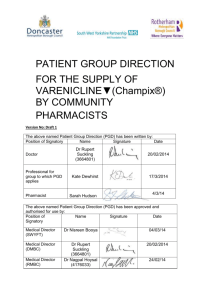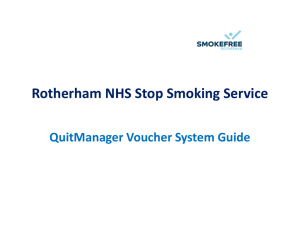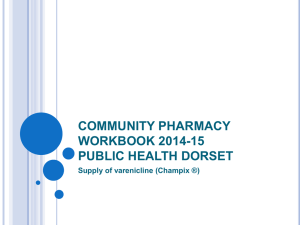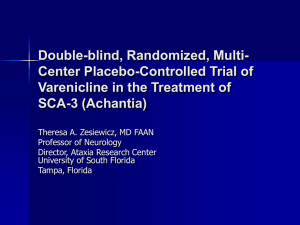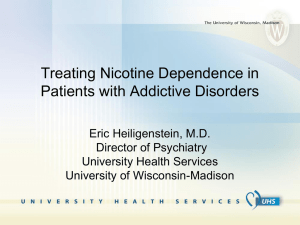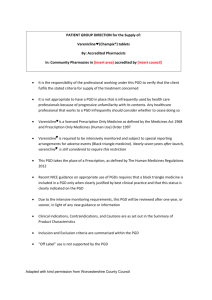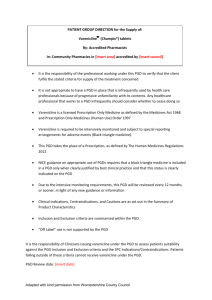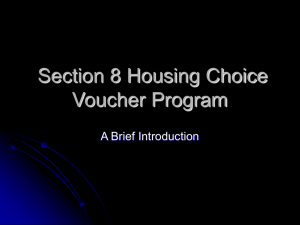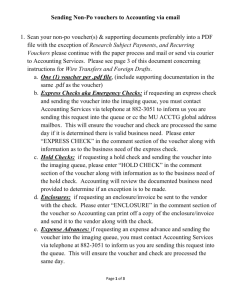SWYFT SOP Champix voucher section 1
advertisement
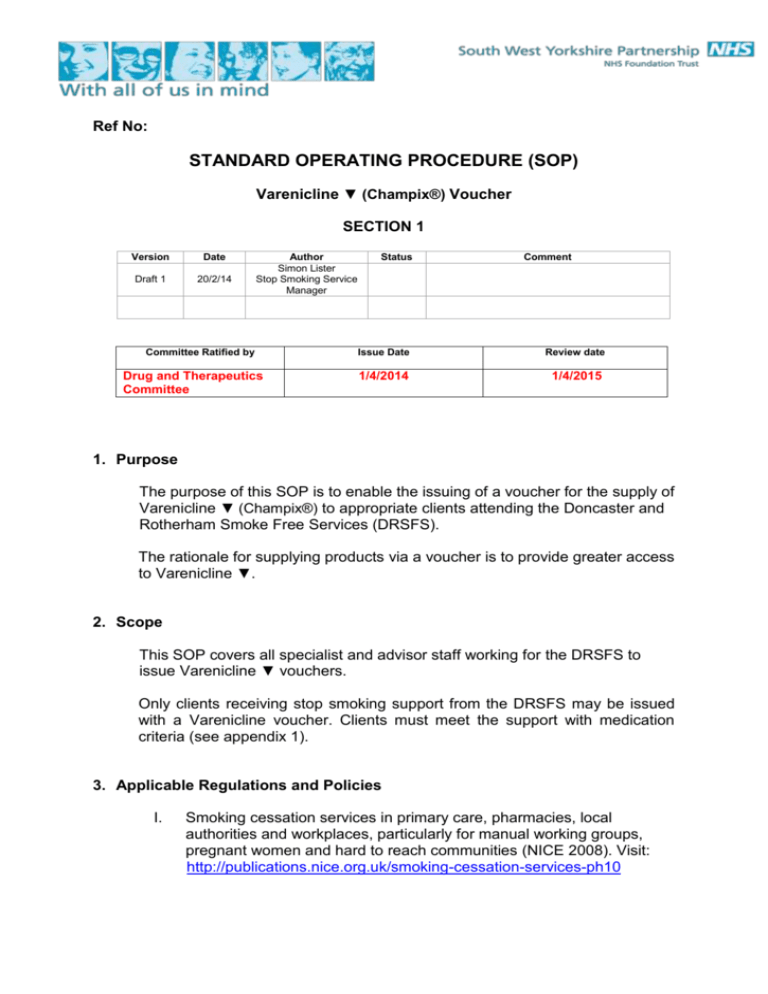
Ref No: STANDARD OPERATING PROCEDURE (SOP) Varenicline ▼ (Champix®) Voucher SECTION 1 Version Date Draft 1 20/2/14 Author Simon Lister Stop Smoking Service Manager Committee Ratified by Drug and Therapeutics Committee Status Comment Issue Date Review date 1/4/2014 1/4/2015 1. Purpose The purpose of this SOP is to enable the issuing of a voucher for the supply of Varenicline ▼ (Champix®) to appropriate clients attending the Doncaster and Rotherham Smoke Free Services (DRSFS). The rationale for supplying products via a voucher is to provide greater access to Varenicline ▼. 2. Scope This SOP covers all specialist and advisor staff working for the DRSFS to issue Varenicline ▼ vouchers. Only clients receiving stop smoking support from the DRSFS may be issued with a Varenicline voucher. Clients must meet the support with medication criteria (see appendix 1). 3. Applicable Regulations and Policies I. Smoking cessation services in primary care, pharmacies, local authorities and workplaces, particularly for manual working groups, pregnant women and hard to reach communities (NICE 2008). Visit: http://publications.nice.org.uk/smoking-cessation-services-ph10 4. II. Local Stop smoking Services: Service delivery and monitoring guidance 2011/12. (Department of Health 2011). Visit: http://www.dh.gov.uk/prod_consum_dh/groups/dh_digitalassets/docum ents/digitalasset/dh_125939.pdf III. SWYPFT Patient Identification Policy. Who will Undertake the Procedure All specialist and advisor staff working for the DRSFS who have completed the services Intermediate Training. The DRSFS Service Manager is responsible for holding/monitoring a training log. 5. I. II. Procedure Check the client’s identification in accordance with the Trust’s Identification Policy and against the record on Quitmanager (if available). Check the client’s eligibility against the inclusion criteria, vouchers will only be issued to clients who meet all of the inclusion criteria below. Please note: it is the dispensing pharmacist’s responsibility to complete the inclusion/exclusion criteria and client consent sections of the voucher and the pharmacist carries the legal responsibility for the supply of Varenicline under the PGD. Varenicline ▼ Voucher Inclusion Criteria Registered with a Doncaster or Rotherham General Practice Attending a Doncaster and Rotherham Smoke Free Services clinic Set a quit date. Age 18 years or above Consent has been obtained and recorded. (Clients must be informed that information relating to the supply of Varenicline under the PDG needs to be passed to other health service organisations, in particular their GP and their local Smoke Free Service in order to ensure proper record keeping and patient safety.) III. IV. Check the client’s eligibility against the exclusion criteria on the voucher. Vouchers must not be issued if the client meets (or is unable/unwilling to answer) any of the exclusion criteria in the table below Varenicline ▼ Voucher Exclusion Criteria Person is aged under 18 years Pregnant or breastfeeding women The client has a history of: Renal disease Epilepsy Sensitivity to Varenicline or any of its excipients Psychiatric illness V. VI. VII. VIII. Pack Day Dose Titration pack 1-3 4-7 8-14 0.5mg (white tablets) once a day 0.5mg (white tablets) twice a day 1mg (blue) twice a day Maintenance pack 15 to end of treatment 1mg (blue) twice a day IX. X. XI. XII. XIII. Discuss how to use Varenicline (i.e. explain how to use the titration and maintenance packs/ that clients should plan to quit within 1-2 weeks of starting Varenicline /each tablet should be swallowed whole with plenty of water and can be taken with or without food) Discuss possible side effects. Advise the client to read the product information leaflet prior to commencement of treatment. Complete the first 3 sections of the voucher (see appendix 2), i.e. the client details, the advisor details and whether the client requires the titration or maintenance pack (see table below). Supply per voucher (2 weeks) 11 tablets 14 tablets 28 tablets Vouchers will be issued on a fortnightly basis to a maximum total of 12 weeks (i.e. a maximum of 6 vouchers per client). Issue the top 2 copies of the voucher (blue and yellow copies) to the client and retain the bottom pink copy for record keeping purposes, vouchers cannot be issued to a client representative. Inform the client of the participating pharmacies where the voucher can be redeemed (see attached list). Record the voucher number/dose/quantity in the ‘session’ screen in QuitManager. Varenicline will be supplied under the supervision of a pharmacist in line with the Varenicline PGD. 6. Side effects Mild side effects include: nausea, vomiting, GI discomfort, diarrhoea, dyspepsia, constipation, increased appetite, somnolence, flatulence, dizziness, headache, drowsiness, dry mouth and fatigue Severe side effects include chest pain, psychosis and suicide ideation. For more detail on the potential side effects of varenicline visit the Electronic Medicines Compendium at: http://www.medicines.org.uk/emc/default.aspx The Latest MHRA safety bulletin gives the following advice for health professionals: • Patients and their family or care-givers should be made aware of the possibility that trying to stop smoking might cause symptoms of depression. • Patients who are taking varenicline who develop suicidal thoughts or behaviour should stop their treatment and contact their doctor immediately. • Varenicline should be discontinued immediately if agitation, depressed mood, or changes in behaviour are observed that are of concern for the doctor, patient, family, or caregiver. • Patients with serious psychiatric illness did not participate in the premarketing studies of varenicline, and the safety and efficacy of varenicline in such patients has not been established. Care should be taken when prescribing varenicline to patients who have a history of psychiatric illness (Please note: clients will a history of psychiatric illness are excluded from the PDG) For the full bulletin visit: http://www.mhra.gov.uk/Safetyinformation/DrugSafetyUpdate/CON084736 7. Adverse Reaction Procedure Compliance and adverse reactions will be monitored at the weekly follow-up. Mild adverse reaction such as nausea will be recorded in the client record and the client will be advised to stop taking Varenicline and to consider Nicotine Replacement Therapy. Severe adverse reactions such as suicide ideation will be recorded in the client record and reported to the DRSFS Service Manager (or deputy) immediately. The client will be advised to stop taking Varenicline immediately. The Service Manager will investigate the incident and contact the Mental Health Access Team (Rotherham – 01709 302670 OR Doncaster 01302 798400) for advice. The incident will be escalated through the Trusts incident reporting system and reported to the clients GP Staff will report any adverse reactions in accordance with the UK Adverse Drug Reaction Reporting Guidelines (Yellow card system available at; http://www.yellowcard.gov.uk/). The MHRA recommend all adverse reactions to black triangle medications should be reported. 8. Follow-up Advice Clients will be seen by the Stop Smoking Advisor weekly for at least 4 weeks after the quit date and by the pharmacist at each supply of Varenicline. Advise the client to call the DRSFS (Doncaster 01302 640064 OR Rotherham 01709 422444) if they need advice in addition to the weekly visit. Criteria for the stopping Varenicline treatment immediately: The Client does not want to continue treatment. The stop smoking advisor or pharmacist believes that Varenicline treatment is no longer appropriate. An absolute contra-indication is brought to light or develops. The client develops agitation, depressed mood, suicidal thoughts or other serious mood changes (client to be referred to GP for prompt medical advice) Side effect is so severe as to impair quit attempt 9. Supporting Materials Varenicline Client Assessment Form (the voucher). Access to Quitmanager 10. Definitions Quitmanager is the Doncaster and Rotherham Smoke Free Services dedicated electronic client record.
